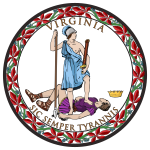| |||||||||||||||||
| Turnout | 67.0% (voting eligible)[1] | ||||||||||||||||
|---|---|---|---|---|---|---|---|---|---|---|---|---|---|---|---|---|---|
| |||||||||||||||||
Warner: 40–50% 50–60% 60–70% 70–80% 80–90% >90% Gilmore: 40–50% 50–60% | |||||||||||||||||
| |||||||||||||||||
| Elections in Virginia |
|---|
 |
The 2008 United States Senate election in Virginia was held on November 4, 2008. Incumbent Republican Senator John Warner decided to retire instead of seeking a sixth term. Former Governor Mark Warner (unrelated) won the open seat by more than 31 percentage points. Warner became the first Democrat to win this seat since 1966. This was also the first time since 1964 that the state voted simultaneously for a Democratic presidential candidate and a Democratic Senate candidate, having voted for Barack Obama in the presidential election, albeit by a far lesser margin. This was Virginia's first open-seat election since 1988. Mark Warner's inauguration marked the first time since Harry Flood Byrd Jr. left the Democratic Party to become an independent in 1970 where Democrats held both of Virginia's Senate seats.
Warner's large margin of victory was reflected throughout the state — Gilmore won only six counties and independent cities (Augusta, Colonial Heights, Hanover, Poquoson, Powhatan and Rockingham) and his margin didn't exceed more than 2,000 votes in any of them. As of 2023, this is the last time Amelia County and Bland County voted Democratic. This is the last time that the winner of the United States Senate election in Virginia won a majority of Virginia's counties and independent cities.
- ^ Dr. Michael McDonald (March 31, 2012). "2008 General Election Turnout Rates". George Mason University. Archived from the original on January 12, 2013. Retrieved March 4, 2013.





